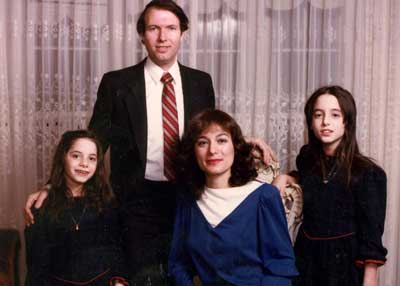The last that Israel Greenwald’s daughters saw of him was in February 1986. Yael, then 7, had the flu, and her father stayed up all night with her; the next morning, he hugged Michal, 9, when he left her at her bus stop. They never saw him again. The married father of two girls, a diamond dealer and a religious man with no criminal record, simply seemed to disappear.
It was not until two decades later, when a government witness led investigators to Mr. Greenwald’s makeshift grave in a Brooklyn garage, that his family began to find out what had happened. Mr. Greenwald had been killed by two New York Police Department detectives who were secretly working with the Mafia.
On Thursday, Mr. Greenwald’s family settled a civil suit against the City of New York for $5 million. Several more lawsuits against the city brought by families of those killed by the two detectives, Stephen Caracappa and Louis Eppolito, known as the Mafia Cops, are scheduled to go to trial this fall in Federal District Court in Brooklyn. Another family settled with the city in January for $5 million.
The detectives were convicted in 2006 of eight murders, two attempted murders and one murder conspiracy, among other crimes. They are serving multiple life sentences.
Several years after joining the police force in 1969, the detectives agreed to a partnership with Anthony Casso, known as Gaspipe, the No. 2 man in theLuchese crime family, the jury found at the detectives’ trial. Over six years, they killed at the direction of Mr. Casso and provided him with confidential information. They were paid a total of the $375,000.
Mr. Greenwald’s tangential involvement with the Mafia started in 1985, when he went to Britain to help a business associate buyTreasury bills there. When he returned, theFederal Bureau of Investigation questioned him about the source of the bills. Mr. Greenwald said the source was legitimate, as he believed it was. However, the bills had apparently originated with someone linked to Mr. Casso.
In 1985 or 1986, a longtime criminal named Burton Kaplan, who worked for Mr. Casso, hired Mr. Eppolito and Mr. Caracappa to kill Mr. Greenwald to prevent him from cooperating with the F.B.I.’s inquiry. Mr. Kaplan had heard about the detectives through a cousin of Mr. Eppolito’s whom he had met in prison.
Mr. Casso welcomed the inside help, Mr. Kaplan said in trial testimony.
In February 1986, the rogue detectives used a confidential police database to find Mr. Greenwald’s home address, the type of car he drove and its license plate number. They pulled over the car, told him they were detectives and asked him to come to the precinct because he was a suspect in a hit and run. Instead, they took him to a warehouse on Nostrand Avenue, where Mr. Caracappa and another man killed him, while Mr. Eppolito acted as a lookout.
They buried the body in the garage, where it stayed for almost two decades, until a person cooperating with the government in 2005 told investigators where it was. That led to the arrests of Mr. Caracappa and Mr. Eppolito, who had both retired. (Mr. Eppolito had retired in 1990, and Mr. Caracappa in 1992.)
Until Mr. Greenwald’s body was found, his wife and two daughters had no idea what had happened. Without it, the family had not been able to get life insurance or social services, their lawyers said in a statement, and “the family lost their home and their car.”
After killing Mr. Greenwald, Mr. Caracappa and Mr. Eppolito committedseveral other murders for Mr. Casso, including the killings of a Staten Island man whom they stuffed into a trunk, another man gunned down while changing a tire on his car and another who was left dead with a canary stuffed into his mouth after the detectives identified him as an informer.
The lawsuit on behalf of the Greenwald family says that city officials knew about the detectives’ Mafia connections. In 1984, for instance, Mr. Eppolito was suspended after the F.B.I. alerted the Police Department that he had given intelligence files to a member of the Gambino crime family.
The city had opposed the lawsuits from the victims’ families, but last year, Judge Raymond Dearie of Federal District Court in Brooklyn said they could go forward. Judge Dearie wrote that there was a “systemic failure” in the Police Department to handle corruption during the detectives’ tenure, and that had Mr. Eppolito been effectively disciplined or dismissed when he was caught handing over the confidential records, these murders might not have occurred.
The department did not immediately respond to a request for comment. Nicholas Paolucci, a spokesman for the city’s Law Department, said that “settling this case was in the best interest of the city.”

